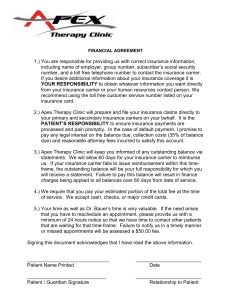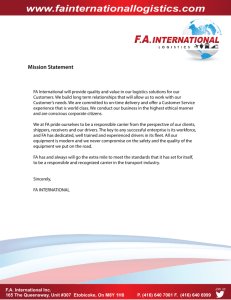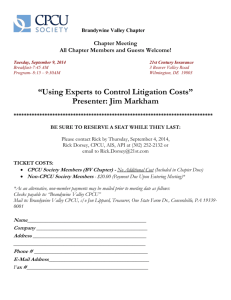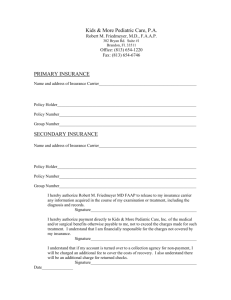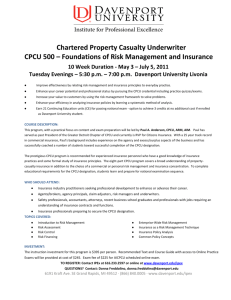Ethics Case Studies
advertisement
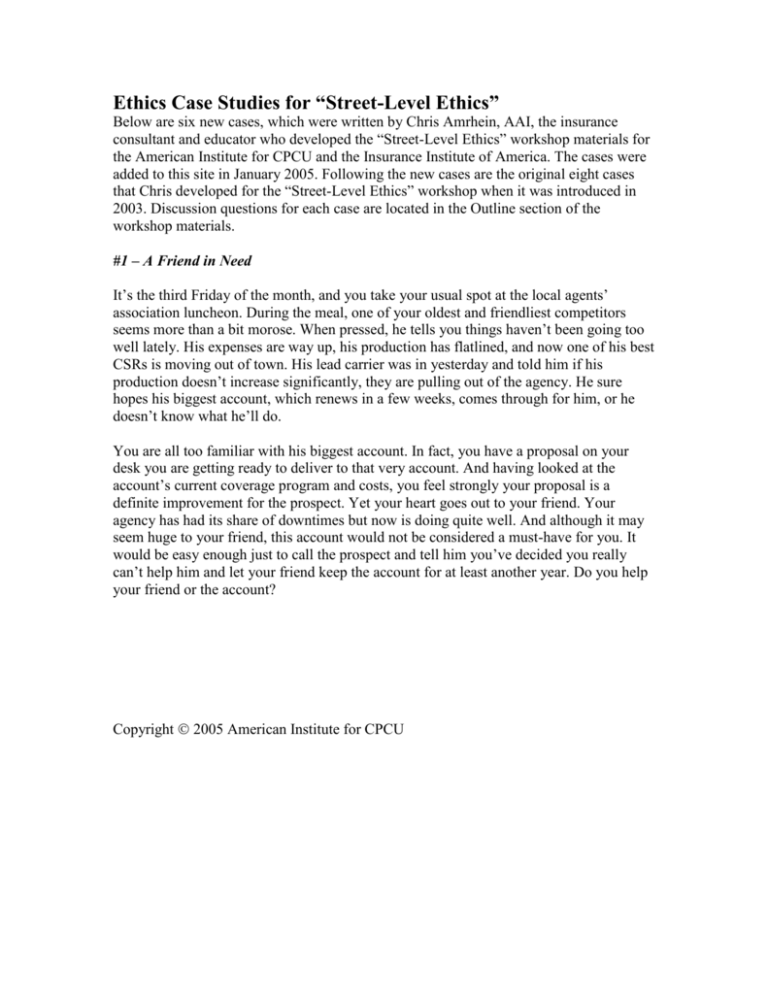
Ethics Case Studies for “Street-Level Ethics” Below are six new cases, which were written by Chris Amrhein, AAI, the insurance consultant and educator who developed the “Street-Level Ethics” workshop materials for the American Institute for CPCU and the Insurance Institute of America. The cases were added to this site in January 2005. Following the new cases are the original eight cases that Chris developed for the “Street-Level Ethics” workshop when it was introduced in 2003. Discussion questions for each case are located in the Outline section of the workshop materials. #1 – A Friend in Need It’s the third Friday of the month, and you take your usual spot at the local agents’ association luncheon. During the meal, one of your oldest and friendliest competitors seems more than a bit morose. When pressed, he tells you things haven’t been going too well lately. His expenses are way up, his production has flatlined, and now one of his best CSRs is moving out of town. His lead carrier was in yesterday and told him if his production doesn’t increase significantly, they are pulling out of the agency. He sure hopes his biggest account, which renews in a few weeks, comes through for him, or he doesn’t know what he’ll do. You are all too familiar with his biggest account. In fact, you have a proposal on your desk you are getting ready to deliver to that very account. And having looked at the account’s current coverage program and costs, you feel strongly your proposal is a definite improvement for the prospect. Yet your heart goes out to your friend. Your agency has had its share of downtimes but now is doing quite well. And although it may seem huge to your friend, this account would not be considered a must-have for you. It would be easy enough just to call the prospect and tell him you’ve decided you really can’t help him and let your friend keep the account for at least another year. Do you help your friend or the account? Copyright 2005 American Institute for CPCU #2 – The Case of the Absent Audit Talk about being in the right place at the right time! One of your small restaurant accounts has been chugging along for years with fairly level sales. Then, about nine months ago, a large new housing development (single-family homes and apartments) appeared along the same road, and your account is suddenly one of the hottest spots in town. Her sales are going through the roof, and every Friday when you stop for lunch, she is beaming ear to ear at the crowded dining room. On the one hand, you are happy for her new-found success. On the other, you are dreading renewal time. You know that when the carrier finds out about the much higher sales figures, it will do an audit that will make her head spin. You’ve tried to prepare her for it, but since she’s never had to pay an additional audit premium in the past, you aren’t really sure she has gotten the message. Renewal time comes and goes, and lo and behold, no audit appears. You drop an e-mail to the underwriter and ask where the audit is in the pipeline. To your surprise, the return e-mail says that past audits have generally revealed that these types of accounts generate insufficient additional audit premiums to justify the resources and effort. So the carrier’s position is now simply to close the policy year on these accounts without an audit. As you read the message on your computer, you find yourself with mixed emotions. Your client just caught a major break, but you also know the carrier is leaving a lot of money on the table. What’s your next step? Copyright 2005 American Institute for CPCU #3 – The Life of a Field Underwriter One of your top agencies is positively salivating at the next trip your company is sponsoring. But there is one fly in the ointment. In addition to the increase in property and casualty premium required for the agency to qualify, your employer has added a life requirement. While minimal, the rule has been handed down from on high—no matter how much P&C the agency writes, without at least one life insurance application during the qualification period, the agency isn’t going. You can’t believe that in an 18-month period, an agency of this size hasn’t written a single life insurance policy with your company, but this one hasn’t. When you called and asked about it, the agency told you quite clearly that your company’s life insurance policies are among the worst in the business, and they can’t ethically place any of their clients with you when the agency has other carriers with vastly superior life products. Besides, they find it hard to believe you would disqualify them from the trip considering the amount of P&C they place with you. While relating this tale to one of your compatriots, he suggests a simple solution. “Call them up and tell them to write a policy on YOU.” When you question the wisdom of this, and also point out you really don’t need another life policy, your compatriot responds, “Okay, then you tell them they aren’t going on the trip. Look, a couple of my agencies were in the same boat, so I bought policies from them. Nothing extravagant, just enough to qualify them for the trip. Once the trip is over, I’ll drop the policies, with no harm done. You know they deserve to go, and our life products are pretty lousy. Why punish the agency for doing the right thing by their clients?” You have to call the agency. Are their trip plans dead, or do you get a life? Copyright 2005 American Institute for CPCU #4 – Who’s the Fairest of Them All? Your company recognizes the market is softening again and, determined not to get into the pricing free-for-all that dominated the last soft market, decides an underwriting pricing strategy is in order. In your underwriting managers meeting, three “fair” solutions are suggested. One approach argues the fairest solution is to offer certain discounts across all the accounts of certain types. Restaurants, for example, would get maximum discounts of a certain percentage, retailers another, etc. The second solution suggests the fairest approach is to recognize some accounts are preferable to others, and price them accordingly. This requires dividing accounts into platinum, gold, and silver (the idea came from a frequent flyer program). Under this approach, the platinum accounts would get the most aggressive (lowest) pricing, the gold market would get medium discounts, and the silver, full manual rates. The third solution is much like the second, except its proponents argue the “fairest” approach is to designate not the accounts but the carrier’s agencies as one of the three levels. Then when asking for quotes, the platinum agencies could get the deepest discounts, the gold would get medium discounts, and the silver, no discounts at all. Which of the three proposals do YOU think is fairest? Why? Copyright 2005 American Institute for CPCU #5 – Patch or Match? These hail storms are enough to drive an adjuster crazy! As you pull up to the umpteenth house turning in a claim from the most recent golf-ball-size bombardment, you can already tell what’s coming. You can see from the driveway that on the front and one side of the house, the siding looks like it’s been hit by grapeshot fired from a cannon. It will definitely have to be replaced. Walking around the outside of the house with the owner, you note the other side and back seem untouched. You tell the owner you can approve replacing the two damaged sides, but there will be no need to pay anything for the other two. “But wait a minute!” the owner cries. “This siding goes back a few years. There is no way those new sides are going to match the old ones. If they don’t match, my house is going to look stupid. And I know folks who tried to sell their homes with siding that didn’t match, and they took a huge hit on the selling price. So it seems only fair that you replace all four sides. After all, every bit of this problem was caused by the hail storm.” You understand his problem, and in fact, find his argument reasonable. The policy speaks to replacing damaged property only. While the argument as to whether siding which no longer matches is considered “damaged” is one often debated by coverage experts, the basic insurance principle of making the insured “whole” certainly favors the owner’s viewpoint. With all the hail damage in the area, you know no one will question your decision on this claim. What do you decide? Copyright 2005 American Institute for CPCU #6 – Do Wrong and Wrong Make It Right? You can’t believe what you are holding in your hand. This should have been the simplest claim in the world to pay, but not any more. For some reason, of the hundreds of polices you have seen from this carrier on this type of account, this one is totally messed up. The usual endorsements are missing, including the one that provides coverage for this particular claim. When you check with the underwriter, he claims the agent asked for the policy that way. When you call the agent, she tells you she just asked for the typical policy. So one of them made a big mistake, but you don’t know which. All you know for sure is that this insured is being given the honor of paying for the mistake. You know if this account had been handled by standard procedures, the claim would be covered. But you also know that following the policy in your hand means you have to turn it down. If you do, by all rights, the insured should be suing somebody for E&O. Some days you just hate this job! Do you decide not to punish the insured for the mistakes of others? Or do you follow the clear language of the policy you are holding? Copyright 2005 American Institute for CPCU These are the original case studies from Street-Level Ethics. Case Study #7 – How Low Will You Go? You’ve worked on this account for the last five years, writing it for the last three. Knowing that every year, at renewal time, you are going to have to participate in another beauty contest, you have worked a long time with your carrier’s underwriter to consider all the coverage and pricing options. As you head for the appointment, you have prepared for potential competition, having in your pocket price quotes ranging from $35,000 to $52,000. The underwriter has made it clear that the carrier believes $52,000 to be the correct price, but with various credits applied and commissions given up, the price could be pushed down to the lower number. “Don’t give up anything you don’t have to,” are the underwriter’s last words on the subject. Upon arriving at the appointment with your client, you are surprised to find yourself the only agent in the room. Your client smiles and says, “My partners and I have been very impressed with your integrity and service over the past three years. After much discussion, we’ve decided to forgo the shopping expedition this year and just continue our coverage with you. We trust that despite the lack of competition, you will still do the best you can for us. So what do you have?” Copyright 2003 American Institute for CPCU Case Study #8 - The Last Minute Certificate Crunch You are closing up late on Friday afternoon. Everyone else has gone home, but as you are locking the door, one of your best small contractor clients rushes up. “Please,” she begs. “I need a certificate of insurance right away or the general contractor is going to hold my money until Monday. I can’t do that, because our cash flow is short and I have to pay my employees today. Help!” “Sure, glad to help,” you reply, opening the door and inviting her into the agency reception area. “Just wait right here, and I’ll get that certificate.” You return to your office and pull her account up on the computer. To your chagrin you note her account is currently written through an E&S market, and you have no authority to issue a certificate. Calling the phone number of the broker, you get their “gone for the weekend” message. They gave an emergency number, but upon calling it, you learn it is an independent claims office, and they can’t help you with a certificate. They insist you’ll have to call the broker on Monday. Trying a long shot, you call the carrier and actually get someone this late on a Friday! But they tell you only the E&S broker listed on the account has the carrier’s authorization to issue the certificate. Hanging up, you stare at your desk. You are certain the broker will issue the certificate on Monday without any problem, but what are you to do about your anxious client who is waiting in the outer office? Copyright 2003 American Institute for CPCU Case Study #9 - E&S: When Is “Worse” Better? Your state has a law that states a licensed agent is not allowed to deliver an E&S quote on an account for which an admitted carrier is willing to write the business with equivalent coverage (the law doesn’t mention premium amount as a factor, only coverage). One requirement of the law is that you must furnish the quoting E&S broker an “evidence of diligent effort” form listing three of your admitted carriers who have refused to write the risk. Submitting the account to several of your carriers, you quickly get three denials, fill out the diligent effort form, and obtain an attractive E&S quote for the account. Prior to delivering the E&S quote, however, one of your admitted carriers surprises you with a quotation on the account, with slightly better coverage but at a significantly higher premium. Feeling you have to follow the law, you reluctantly shelve the E&S quote and go to your appointment with the prospect prepared to present the admitted quote. Upon arrival, however, you discover one of your competitors on the way out. Knowing each other well over the years, you smile, exchange a few pleasantries, and wish each other luck on the account. Then, when you are ushered into the prospect’s office, you see a proposal on his desk bearing the name of the same E&S carrier you had shelved. Your fears are confirmed when, after presenting your quote, the prospect thanks you for your fine presentation, but as costs are a key concern, and the coverages are similar, he’s decided to take the quote from the other agent. You know the other agent also represents the admitted carrier from which you obtained your quote. You don’t know if he ignored the law or simply never submitted the account to that carrier. You also know that, for him as with you, there was no shortage of admitted carriers who were willing to refuse the account, so obtaining the “diligent effort” form was no problem. You do not believe the prospect will understand the purpose of the diligent effort law, and anything you say now will likely be taken as a lastditch effort to win the account at a higher price. The E&S proposal is with a good company, and you feel it really is the better deal for the prospect. But the law is the law. What do you do now? Copyright 2003 American Institute for CPCU Case Study #10 - Wrong Is Wrong, but Right for Client Your prospect has been open and honest about seeking proposals from several agents in addition to yours. You arrive for your appointment confident that you have done the job right and have a great deal for the coverage he needs. To your chagrin, following your presentation, he tells you he has received a significantly lower quote yet providing far better coverage. You ask if you might see it, to get a better understanding of what you can do to improve your services in the future. Seeing no reason to object, the prospect hands you the winning proposal, which you are amazed to find is a package written by one of your own carriers. Since you write the product yourself, you are well aware it is comprehensive in coverage and highly competitive in premium. In fact, if you didn’t know the prospect’s business was ineligible for the package, you would have proposed it yourself. The ineligibility does not arise from the prospect, but rather from another occupancy in the same building. You also realize part of the competitive price results from the carrier largely delegating the underwriting of the package to the agency, so there is only a slight chance the carrier will ever inspect the business and discover the ineligibility. Your competitor who presented the proposal is new to the industry, and you can easily understand how he made such a mistake. The package is clearly a great deal for the prospect, who you believe is not going to understand the underwriting “technicality.” You also have no desire to disparage or embarrass the other agent for what is most likely an innocent “rookie” mistake. What do you do? Copyright 2003 American Institute for CPCU Case Study #11 – School’s Out You’ve been an underwriter for ABC Insurance Company for several years. A few months ago, you were able to put together a very attractive package proposal for one of your company’s top agents, and he told you in no uncertain terms that if it got him the account, “I won’t forget what you did for me!” You have heard similar sentiments before, so you took it as a nice thought and went about your business. Two weeks ago you and your wife were pleasantly surprised when your youngest daughter was accepted into a private church school that has the best reputation in town for elementary education. The “surprise” comes from the fact that you know the school always receives far more applicants than it can accept, and at the last meeting with the admissions office, you left with the feeling your daughter was well down the waiting list. But accepting the great news, you happily prepare your daughter for the coming school year. Tonight you attended your first “welcome new parents” meeting at the school, and you turned to find the agent walking over to greet you. “Is this your lovely wife?” he asks pleasantly. “Congratulations on your daughter being accepted. I’m sure she’ll love it here as much as our children have.” As he turns to greet other guests, he conspiratorially lowers his voice so only you can hear, and adds, “Did you happen to notice my name on your admissions application as one of the board? I told you I wouldn’t forget.” Suddenly you feel compromised. You truly didn’t see his name, but you know if the subject came up, your denial would appear self-serving. You don’t feel you did him any special favors on his proposal, but knowing his status with the company, you were certainly aggressive with your pricing. Could you be accused of favoritism, just to get your child into the school? What if you report this to your superior, and she decides you need to pull your child from the school to avoid the appearance of impropriety? Your wife will be extremely upset, and your daughter will forfeit an undeniably great educational opportunity. What do you do now? Copyright 2003 American Institute for CPCU Case Study #12 – Ignorance Can Be Bliss You’ve been underwriting a performance bond for an experienced construction firm. Everything you reviewed looks favorable, and you gave the bond your final approval just before leaving the office this afternoon. First thing tomorrow morning, you plan to finalize the paperwork and call the agent to tell her of the approval. Tonight is your regular Alcoholics Anonymous (AA) meeting. Upon arrival, you notice several new faces. It’s always good to see others making the decision to turn their life around. After everyone settles into their chairs, one of the new visitors stands up to introduce himself. To your shock, he turns out to be the president of the construction company whose bond you just approved. He admits emotionally to the group he had fought against the idea of coming to the meetings. He was sure he really didn’t have a problem he couldn’t work out on his own. What finally changed his mind was a “tough love” confrontation with his bookkeeper and job foreman that morning. His drinking had led him to slack off on supervising his jobs, and he had been treating the company bank account as his personal party fund. Both employees informed him in no uncertain terms he was endangering the company’s ability to survive, they were tired of covering up for him, and if he didn’t get help, they were quitting. He promised them he’d do what it took to straighten himself out. And he’s sure they can get the company back to full health if they can finish the jobs they currently have underway, plus the new one he just won the bid for and will start work on as soon as his performance bond comes through. He asks for the group’s help in keeping his pledge. The next morning, you sit at your desk and stare at the bond application that no one except you knows you’ve already approved. What do you do now? Copyright 2003 American Institute for CPCU Case Study #13 – He Who Hesitates Gets Lost You have just been assigned to take over a pending claim file for an adjuster who resigned last week. Upon opening the file, you barely hide your disgust. Evidently well aware he was leaving, the former adjuster just dragged his feet on this one until he could pass the buck. And now it’s in your lap. The problem is the claim is not covered by the policy, but it’s one of those famous “gray area” scenarios. Not “gray” due to the coverage, but “gray” because while the lack of coverage is clear to you as a trained professional, it is based upon the type of technical policy wording that no insured on the planet is going to be happy to hear. And this particular insured is an elderly lady who just happens to be the mother of one of your carrier’s top agents. You have no problem understanding why the other adjuster didn’t want to deliver the bad news. Heck, YOU don’t want to deliver it! And now the situation is complicated because the claim process has dragged on so long. If you deny the claim after all this time, you know things are surely going to hit the fan. You’ve heard of other times when claims fell through the cracks or were unreasonably delayed due to huge case loads or simply mistakes, and the carrier has decided to “do the right thing” and just pay the claim, regardless of the coverage. “They just charge it to the public relations budget,” one of his supervisor’s had once sighed. Easy to say, but what do you do? Copyright 2003 American Institute for CPCU Case Study #14 – Gone With the Wind It was the biggest storm to hit the area in decades. You saw the news stories, but nothing prepared you for the total devastation you found when you arrived to set up the first catastrophe claims office for your carrier. The designated location was almost impossible to find, since all the street signs were gone and nearly every landmark had disappeared with the trees. There didn’t seem to be an undamaged building for miles in every direction. Shell-shocked agents and insureds were straggling into your claims trailer, begging for any assistance you could offer. Your plan had been to determine from the local agents which of their insureds needed help the quickest, and also to give you some idea of the coverage each had purchased. But the agencies were damaged as badly as their clients, and few client records are available. You have your computers but are still awaiting the necessary phone service to connect to the carrier network and pull up the needed information. In the meantime, a growing line of insureds forms at your door. One agent informs you that a major national carrier down the road is so swamped by claimants that they’ve just started taking down the names and handing each claimant a $5,000 check, telling them to use the money to get a place to stay and buy some food and clothing. The carrier will contact them later to start the formal claims process. While you understand the compassion being shown, your feelings that it might not be a totally good idea are confirmed when the agent comments that he knows for a fact some of the folks getting checks don’t even have their coverage with that carrier. Despite your misgivings, the scene of human misery in front of you is overwhelming, and there is no way you and your assistants can handle this flood of dazed and hurting people, much less expect them to understand you can’t pay them anything until you have the proper information. And asking someone who just lost everything they own if they remember their policy number would clearly border on cruelty. Maybe it would be worth paying some money out to the fakes if it means the truly deserving get at least some help quicker. What do you do? Copyright 2003 American Institute for CPCU
